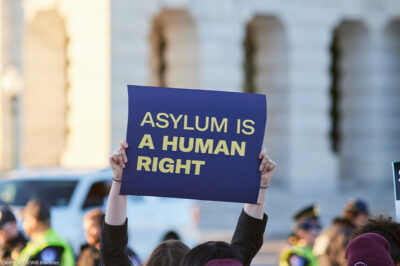The SR arrived in Los Angeles just before police violently attacked immigration rally participants in MacArthur Park. The unjustified violence perfectly illustrated the criminalization of immigrants and the ways in which they bear the brunt of abusive police and immigration tactics.
The NGOs that planned the site visits, presentations and community testimony for the SR visit focused on the federal enforcement system (including raids and detention), workers’ rights and the criminalization of immigrants.
The first day’s testimony began with Maria Elena Hincapie of the National Immigration Law Center (NILC), who presented the history of immigration raids in Los Angeles and discussed the problems inherent with the Social Security “No Match” letters and employer verification databases.
“For almost a year I did not see the sun because I went to work early in the morning and returned home late at night,” said Prakash Gramire from South Asian Network, who talked about the exploitation of Nepali and other South Asian immigrant workers. Prakash stressed that even legal immigrants were forced to work 6 or 7 days a week without overtime pay, breaks or medical insurance because they did not speak English or know how to seek resources.
Representatives from California Rural Legal Assistance brought farmworker issues to the attention of the SR. The most important message was that without proper enforcement of rights and protections of farmworkers, all existing laws are rendered meaningless.
On the second day, community members and advocates talked about youth forced to live on streets or enter the state system when their parents are picked up by immigration authorities, and the forced repatriation of Southeast Asians. “Doesn’t the Constitution and due process apply to immigrants?” asked Cambodian community member “V” while describing the overcrowded conditions and lack of mental health treatment at the San Pedro detention center. V witnessed 20 people crammed into a space meant for six people, immigration officers “mistakenly” classifying Latinos so that they would be beaten up in the Asian pod and the suicide of a Cambodian man who was despondent over his pending deportation.
The second day also highlighted the importance of legal experts and advocates working together with organizers and community members who bear the weight of outrageous immigration laws. Lawyers from the NILC and the ACLU outlined the laws and their effects while community members shared personal stories of how these laws affected themselves and their communities.
Members of the Youth Justice Coalition gave compelling testimony about the series of policies that have criminalized the daily existence of immigrant youth, such as gang databases, gang injunctions and juvenile life sentences without parole.
Homies Unidos wrapped up the SR’s L.A. visit with a tour of Pico Union, MacArthur Park and Koreatown that interwove their personal and familial histories with a sociological analysis of gangs and the pattern of gentrification. “I’m trying to visualize where my mom’s house used to be,” said Alejandro, an organizer with Homies Unidos, while pointing to a vacant, fenced-in lot that once held several homes and is now slated for development into condos or lofts. The demolition of working class family homes is occurring hand-in-hand with increased FBI surveillance and police targeting of immigrant youth in order to meet the thirst of an ever-expanding downtown.
Shiu-Ming Cheer-Gatdula of the South Asian Network wrote this post, with Greg Simons of the Coalition for Human Immigrants Rights of Los Angeles. To learn more about the Special Rapporteur’s visit, go to www.aclu.org/humanrightsofmigrants.




